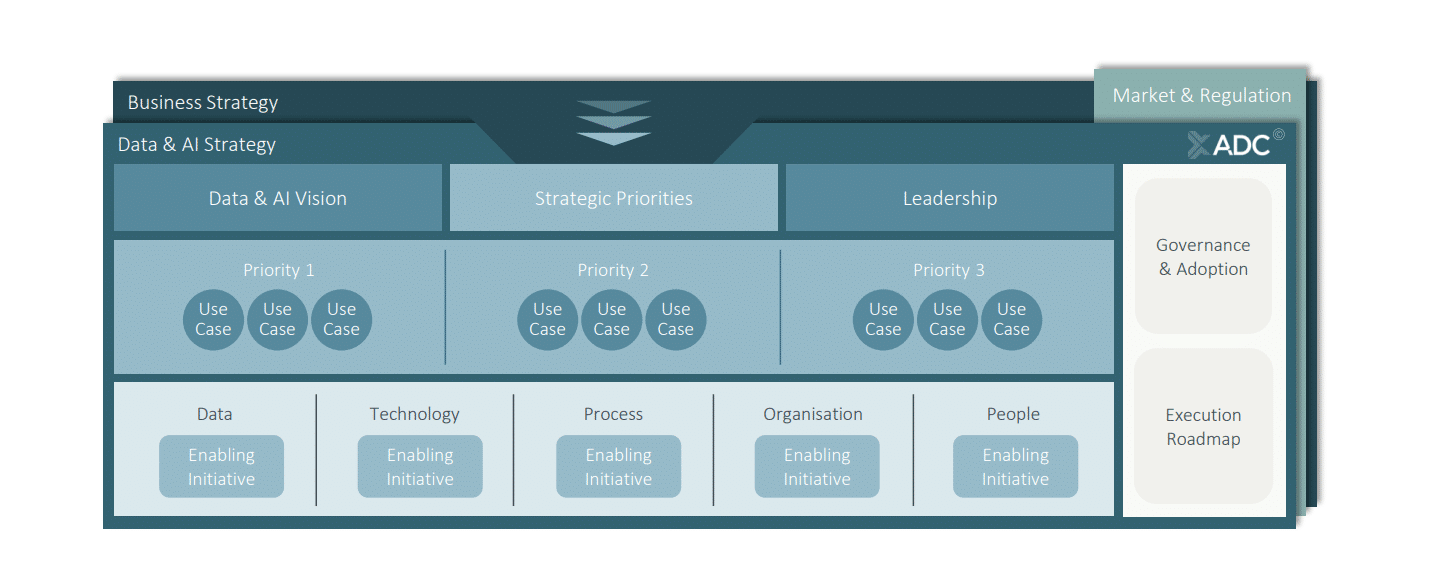As interest in adopting Data & AI applications grows, organisations universally recognise its value but often struggle with where to start. Edward Jansen, Lourens Vale and Cathrine Theill Eriksen teamed up at ADC to develop a unified Data & AI strategy framework, integrating all the necessary components for a successful transformation.
Powering Your Organisation with Data & AI
In today’s rapidly evolving technological landscape, many companies recognise the transformative potential of Data & Artificial Intelligence (AI) but struggle to capture its full power effectively. This struggle often stems from the absence of a cohesive Data & AI strategy. Without a unified approach, efforts to implement AI can become fragmented, leading to inefficiencies and missed opportunities for innovation and competitive advantage.
At ADC, we’ve developed a comprehensive Data & AI strategy framework that integrates all the necessary components for a successful transformation. By addressing each component in the framework and aligning these elements with the organisation’s overall business objectives, we help organisations maximise the value derived from their data assets and AI investments. This alignment not only drives innovation but also ensures sustainable growth, enabling organisations to stay ahead in a competitive market.
The components of the framework include:
Strategic Priorities, Vision & Leadership
A successful transformation demands focus, purpose, and commitment. Data-first organisations excel by having a coherent Data & AI strategy aligned with their overall business strategy. It is therefore essential to first understand the most pressing business priorities, which serve as the leading focus areas of the transformation. These strategic priorities can be organised around various logics, such as business problems, core processes, strategic levers, or tech-led ambitions. In addition to having focus areas, a Data & AI strategy requires a clear vision, defining a distant goal and illustrating the purpose of Data & AI within the organisation.
Leadership plays a crucial role in charting the course toward this goal. Successful transformations are generally led by a committed, Data & AI-savvy management team that drives the organisation towards innovation and growth.
Use-Cases
Within each strategic priority, we identify a cluster of impactful Data & AI use-cases that act as the engines generating value and addressing key issues. These use-cases range from business intelligence (BI) performance dashboards and optimisation algorithms to machine learning models and, more recently, generative AI solutions.
By employing an iterative design thinking process, we first ideate and prioritise these use-cases. Once prioritised, use-cases are validated through detailed business cases that assess both business value (e.g., through estimating the ROI) and feasibility (e.g., by assessing technical requirements). These business cases provide essential input for the allocation of funding necessary for development. This methodical approach ensures that resources are effectively utilised to maximise impact and support the organisation’s strategic objectives.
Foundation & Enabling Initiatives
To successfully develop use-cases and adopt AI in your organisation, you need a robust foundation. This foundation consists of five pillars: data, technology, people, processes, and organisation. It encompasses everything from available data sources and technology stacks to team structures, agile workflows, and data governance policies.
An organisation’s foundation must reach a certain maturity level to successfully enable value-generating use-cases. Since organisations vary in their stages of transformation, the required maturity level differs across each one. As part of the Data & AI strategy, we identify a set of essential enabling initiatives—constructive projects designed to elevate your foundation’s maturity level. While these initiatives may not directly generate immediate value, they are crucial for a successful transformation. Examples include building cloud infrastructure, offering data literacy programs, and establishing robust data management principles.
Governance & Roadmap
Change is at the heart of becoming a Data & AI-driven organisation. Successfully adopting a Data & AI strategy requires an actionable implementation roadmap supported by a strong governance framework to lead the change. The execution roadmap outlines the entire process for integrating enabling initiatives and developing use-cases. Typically, use-cases follow a stage-gating approach, where development is divided into stages (e.g., MVP, prototype, scale) to ensure a flexible and efficient process. To clarify the financial implications, we connect the roadmap to a transparent cost overview of enabling initiatives and use-cases.
Effective change leadership necessitates a robust governance setup with committed leaders and clear responsibilities. Appointed leaders monitor progress while building awareness and engagement within the organisation through a well-defined engagement plan. For established companies, adapting to new ways can be challenging. Throughout the transformation, it is crucial to focus on both adapting existing processes and adopting new initiatives. Striking this delicate balance ensures sustainable progress and long-term success in becoming a Data & AI-driven organisation.
Market & Regulatory Context
When developing a future-focused Data & AI strategy, it is crucial to consider external factors that may influence the direction and design of the organisation. The most significant external factor is the market context, which often functions as the main driver to the business model and strategy. This market context can also inspire your Data & AI strategy by revealing new opportunities and potential disruptions. This insight is key for identifying strategic priorities that leverage Data & AI to enhance competitive advantage.
Equally important is ensuring compliance with regulations such as GDPR, the upcoming AI-Act, and sector-specific regulations. These regulations promote the responsible use of Data & AI within your organisation and can impact the design of use-cases, as well as impose additional requirements on the foundational elements. By staying informed about regulatory changes, we ensure that ethical and legal standards are met throughout the transformation, enabling organisations to strategically navigate the complexities of integrating Data & AI.
ADC Resolution
At ADC, we assist organisations in creating unified and pragmatic transformation plans that encompass all components of the Data & AI strategy framework. We work closely with clients, involving all relevant stakeholders to develop tailored solutions that address specific business needs. Our interdisciplinary teams, composed of strategy consultants and Data & AI experts, collaborate seamlessly to facilitate the process, provide technical advice, and present compelling strategies to C-level executives.
Beyond advising, we actively assist in the development and implementation of Data & AI use-cases, ensuring that our clients’ strategies are well-grounded, technically feasible, and actionable. This holistic approach guarantees that our clients can effectively leverage their data assets and AI investments for sustainable growth and innovation.
Continue the Conversation
Are you interested in discovering how ADC can assist your organisation? To learn more, please contact Edward Jansen (Strategy Lead).

What stage is your organisation in on its data-driven journey?
Discover your data maturity stage. Take our Data Maturity Assessment to find out and gain valuable insights into your organisation’s data practices.














